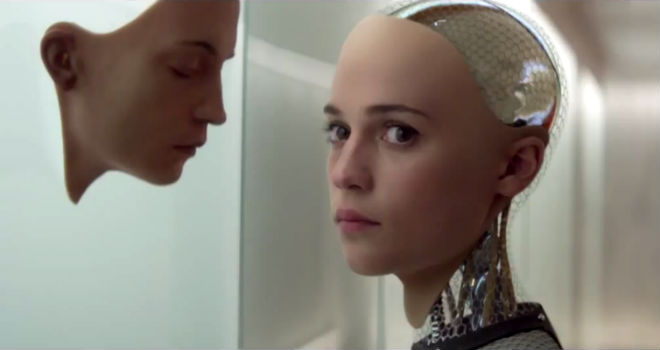At the core of the most accomplished sci-fi is a tendency to reflect the very real concerns of modern society. From Blade Runner to Children Of Men, classics of the genre have succeeded through their ability to transcend their supposed trappings, creating believable worlds through considered execution, often with a troubling thematic focus. This is of course, old hat to novelist, screenwriter and now director Alex Garland. Whether depicting the psychological distress of space-travel in Sunshine or the post-apocalyptic dystopia of 28 Days Later…, the complexities and contradictions of human nature have formed the compelling bedrock of Garland’s best works. With his first foray into the director’s chair, Garland rightfully takes top billing. A haunting, clinically paced thriller set in the very near future, Ex Machina offers a riveting examination of what it means to be human in the modern age.”
Domhnall Gleeson’s Caleb is a coder, working for the world largest search engine, Bluebook. After winning a staff lottery to spend a week with the company’s reclusive CEO, Nathan (Oscar Isaac), he’s whisked away via helicopter to his extravagant estate. Upon arrival, Caleb discovers that this is to be no mere meet-and-greet, and that Nathan intends for him to be the human participant in a version of the Turing test, assessing the level of consciousness of Nathan’s AI creation, Ava (Alicia Vikander). Daily sessions with the eerily human Ava lead Caleb to question Nathan’s motivations, the two men’s relationship becoming increasingly fraught as Caleb finds himself coming to sympathise with Ava’s lonely existence, and engaging with the AI on an increasingly emotional plane.
Like Garland’s best work, Ex Machina fully commits to its premise, creating a convincing environment for its core triad of relationships to develop. A chamber piece, Ex Machina moves along at a relatively glacial pace, Garland’s screenplay favouring long, expansive, dialogue-driven scenes that slowly reveal the film’s thematic concerns rather than rush the plot along. Despite this, the film remains eminently cinematic in its execution. Mark Rigby’s excellent production design renders Nathan’s home-cum-research facility a masterpiece of clinical elegance,while Rob Hardy’s lush landscape photography contributes greatly to the film’s icy tone. Add to the mix a foreboding, varied and very memorable score courtesy of Ben Salisbury and Portishead’s Geoff Barlow, and Garland’s film becomes essential big-screen viewing. At its heart, Garland’s script aims to address some intriguing qualms about notions of creation, god complexes, social surveillance and ultimately, human nature itself. Indeed, the pairing of such broad contemplations with the film’s meditative pace may prove testing for some, and while Garland’s script is otherwise resolutely focused, a bloody bathroom scene jars with the film’s otherwise considered tone. Crucially, Ex Machina is rendered accessible thanks to the sterling performances from the film’s core cast.
Introduced as something of a blank-slate audience surrogate, Caleb proves to be a surprisingly enigmatic protagonist, and Gleeson does a fine job of conveying the character’s inherent decency, given that it’s not till near the midpoint that we learn anything substantial about his past. Isaac has a lot more fun as Nathan, his dialect a curious blend of bro-isms that serves as a counterfoil to his true intentions. He operates in a state of perpetual intoxication, either high on alcohol or himself, pummelling a punching bag to ‘overcompensate’ following a rough night and even breaking into dance in a rare moment of levity. The unspoken conflict between he and Caleb is well established early on, yet takes some unexpected turns, the underlying tension maintained well by Gleeson and Isaac throughout. Despite this compelling battle of wills, its Vikander’s Ava that will stick longest in the memory, capable of conveying a shift in emotional register through actions as minimal as a step backward, or a sudden cock of the head. Vikander’s performance is one of remarkable dexterity, masterfully conveying the sense that Ava’s intentions and desires are never 100% clear-cut beyond what she tells Caleb in their daily sessions. Aided by some extremely convincing VFX courtesy of Double Negative, her enrapturing effect on Caleb should mirror her impact on audiences.
Speaking of audiences, one can’t help but feel pessimistic about the film’s potential reach, not that it should matter. Sci-fi as intelligent and thought-provoking as Garland’s film is an increasing rarity, a think-piece in the guise of a genre film that makes few concessions to its audience, not least in its humdinger of an ending. Ex Machina will stay with you for days.
Check out our red carpet chat with Alex Garland and Domhnall Gleeson here.

